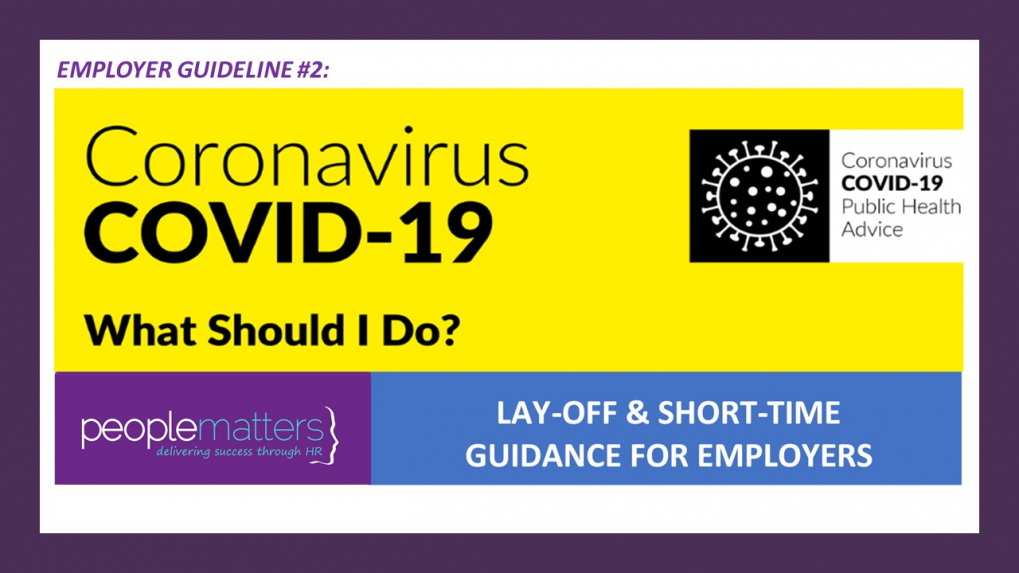
Coronavirus – Lay-off & Short-time – Guidance for Employers
Unfortunately for many employers the current unprecedented challenges presented by Covid–19 has led to unavoidable lay-offs and short time working. Remote working is a great alternative if employers can offer the option to work from home but this is not feasible for many businesses and in many cases such as the hospitality sector the work now ceases to exist. Where there is reduced work or no work available employers will have no choice but to consider options such as short-time working or lay-off.
In being forced to consider any of these options it is essential for employers to communicate with employees as early as possible to minimise uncertainty and provide clarity on supports available.
Short-time Working
Short-time working arises where the employee’s work is temporarily reduced by 50% or more due to factors affecting the business. It avoids the necessity to lay people off and allows employers to retain skilled labour albeit in a reduced capacity. Short-time work support is available from the Department of Social Protection and Family Affairs for the days the employee is no longer working under Jobseeker’s Benefit. Eligibility for income support while on short-time depends on PRSI contributions paid – for further information: https://www.gov.ie/en/publication/eca524-covid-19-information-for-employees/
Lay-off
Lay-off occurs where work ceases to be available and the employer reasonably believes that this will not be permanent and gives such notice to the employee. Many contracts of employment address the circumstances and process should such a situation arise and gives employers the right to lay-off staff without pay. Even if this is not provided for in the contract of employment, in practice many employees will accept this option in favour of an immediate redundancy. Given the current emergency situation that many employers find themselves in, it is anticipated that this will not be challenged although it is important to stress that if lay-off is not provided for in the contract, it could be subject to a payment of wages claim. The alternative for employers is to make employees redundant so the lay-off situation is preferable for both.
When laying off employees the Government have asked if at all possible, to continue paying employees the €203 (amount of the benefit) and the employer will then be able to reclaim this amount directly from the Department of Employment Affairs and Social Protection. This will help alleviate delays in the department. Employers should give employees an RP9 form when they are being laid off but it is expected that in the current crisis, DEASP will waive this requirement and a letter will suffice.
Although we are at the early stages of this crisis, it is worth noting that if employees have been placed on lay-off for a period of more than 4 consecutive weeks or a total of 6 weeks within a period of 13 weeks, the employee reserves the right to claim redundancy. In this situation if the employer is able to provide at least 13 weeks work within 4 weeks of the claim, then the redundancy claim is denied.
In the situation where employers cannot pay employees the payment directly, the Department of Employment Affairs and Social Protection is providing a new Covid-19 Pandemic Unemployment payment for a period of 6 weeks which will enable employees who are laid off to receive a payment as quickly as possible. Application is available online and must be dropped in or posted to an Intreo office. In the coming weeks the individuals Jobseeker application will be assessed and entitlement calculated retrospectively.
https://www.gov.ie/en/service/be74d3-covid-19-pandemic-unemployment-payment/
For further details on lay-off, short-time, managing absence & employee entitlements contact People Matters HR Ltd:
Email: [email protected] or call 098-25899



